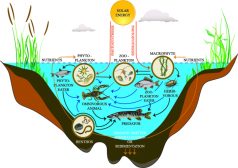Definition
noun
A form of taxis characterized by the directional movement of an organism in response to temperature
Supplement
Taxis is a behavioral response of a cell or an organism to an external stimulus. The movement is characteristically directional. The movement may be positive or negative. A positive taxis is one in which the organism or a cell moves towards the source of stimulation (attraction). A negative taxis is when the organism or a cell moves away from the source of stimulation (repulsion). Thermotaxis is a form of taxis and is characterized by the movement of an organism in response to temperature.
Thermotaxis is the movement of an organism according to the gradient of temperature. For instance, slime molds and certain nematodes (i.e. Meloidogyne incognita) migrate to shallow temperature gradients of less than 0.1C/cm and sometimes as low as 0.001C/cm.1, 2 This behavior is essential in moving towards an environment with an optimal level in soil.3
Word origin: Ancient Greek thermós (“warm, hot”) + taxis
Compare:
See also:
Reference(s):
1 Pline, D., and Dusenbery, J. (1988). Extremely sensitive thermotaxis of the nematode Meloidogyne incognita.Nematology 20:605-608.
2 Dusenbery, D. B. (1992). Sensory Ecology. New York: W. H. Freeman. p.114.
3 Dusenbery, D. B. (1988). Avoided temperature leads to the surface. Behavioral Ecology and Sociobiology, 22:219-223.







